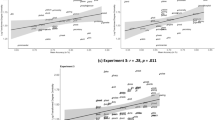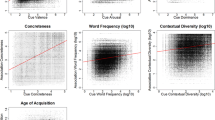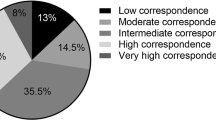Abstract
In many models of lexical and semantic processing, it is assumed that single word processing is a function of the characteristics of the words presented and the distributional properties of the words’ networks. Recent research suggests that semantic characteristics of a target word’s associates may in fact influence target-word responses in lexical-semantic tasks. The present study extends that previous research to examine whether lexical and semantic properties of target-word associates are recruited during lexical and semantic decision tasks, and whether the type of associate information recruited varies as a function of task and concreteness of the target word. We found that lexical-semantic properties of words’ first associates are related to accuracy of responses to words in lexical decision, and that semantic properties of words’ first associates are related to both response time and accuracy in semantic decision. Further, these effects differ depending on the target word’s concreteness. These findings provide new insight about the way words’ associates contribute to semantic representation and processing, even though the associates are not actually presented, moving beyond previous assumptions about lexical-semantic processing of single words.




Similar content being viewed by others
Data availability
All the data and analysis scripts for this article are available online at https://osf.io/gu7hk/. The study was not preregistered.
References
Adelman, J. S., Brown, G. D. A., & Quesada, J. F. (2006). Contextual diversity, not word frequency, determines word-naming and lexical decision times. Psychological Science, 17(9), 814–823. https://doi.org/10.1111/j.1467-9280.2006.01787.x
Balota, D. A. (1990). The role of meaning in word recognition. In D. A. Balota, G. B. Flores d’Arcais, & K. Rayner (Eds.), Comprehension processes in reading (pp. 9–32). Erlbaum.
Balota, D. A., Cortese, M. J., Sergent-Marshall, S. D., Spieler, D. H., & Yap, M. J. (2004). Visual word recognition of single-syllable words. Journal of Experimental Psychology-General, 133(2), 283–316. https://doi.org/10.1037/0096-3445.133.2.283
Balota, D. A., Yap, M. J., Hutchison, K. A., Cortese, M. J., Kessler, B., Loftis, B., Neely, J. H., Nelson, D. L., Simpson, G. B., & Treiman, R. (2007). The English Lexicon Project. Behavior Research Methods, 39(3), 445–459. https://doi.org/10.3758/BF03193014
Barsalou, L. W., & Weimer-Hastings, K. (2005). Situating abstract concepts. In D. Pecher & R. Zwaan (Eds.), Grounding cognition: The role of perception and action in memory (pp. 129–163). Cambridge University Press.
Brysbaert, M., & New, B. (2009). Moving beyond Kucera and Francis: A critical evaluation of current word frequency norms and the introduction of a new and improved word frequency measure for American English. Behavior Research Methods, 41(4), 977–990. https://doi.org/10.3758/BRM.41.4.977
Brysbaert, M., Warriner, A. B., & Kuperman, V. (2014). Concreteness ratings for 40 thousand generally known English word lemmas. Behavior Research Methods, 46(3), 904–911. https://doi.org/10.3758/s13428-013-0403-5
De Deyne, S., Navarro, D. J., Perfors, A., Brysbaert, M., & Storms, G. (2019). The “Small World of Words” English word association norms for over 12,000 cue words. Behavior Research Methods, 51(3), 987–1006. https://doi.org/10.3758/s13428-018-1115-7
Deese, J. (1966). The structure of associations in language and thought. Johns Hopkins Press.
Duñabeitia, J. A., Aviles, A., Afonso, O., Scheepers, C., & Carreiras, M. (2009). Qualitative differences in the representation of abstract versus concrete words: Evidence from the visual-world paradigm. Cognition, 110(2), 284–292. https://doi.org/10.1016/j.cognition.2008.11.012
Hino, Y., Lupker, S. J., & Pexman, P. M. (2002). Ambiguity and synonymy effects in lexical decision, naming, and semantic categorization tasks: Interactions between orthography, phonology, and semantics. Journal of Experimental Psychology: Learning, Memory, and Cognition, 28(4), 686–713. https://doi.org/10.1037/0278-7393.28.4.686
Hoffman, P., Lambon Ralph, M. A., & Rogers, T. T. (2013). Semantic diversity: A measure of semantic ambiguity based on variability in the contextual usage of words. Behavior Research Methods, 45(3), 718–730. https://doi.org/10.3758/s13428-012-0278-x
Kumar, A. A. (2021). Semantic memory: A review of methods, models, and current challenges. Psychonomic Bulletin & Review, 28(1), 40–80. https://doi.org/10.3758/s13423-020-01792-x
Kuperman, V., Stadthagen-Gonzalez, H., & Brysbaert, M. (2012). Age-of-acquisition ratings for 30,000 English words. Behavior Research Methods, 44(4), 978–990. https://doi.org/10.3758/s13428-012-0210-4
Landauer, T. K., & Dumais, S. T. (1997). A solution to Plato’s problem: The latent semantic analysis theory of acquisition, induction, and representation of knowledge. Psychological Review, 104(2), 211–240. https://doi.org/10.1037/0033-295X.104.2.211
McClelland, J. L., & Rumelhart, D. E. (1981). An interactive activation model of context effects in letter perception: I. An account of basic findings. Psychological Review, 88(5), 375–407. https://doi.org/10.1037/0033-295X.88.5.375
Muraki, E. J., Sidhu, D. M., & Pexman, P. M. (2022). Heterogenous abstract concepts: Is ponder different from dissolve? Psychological Research, 86, 2478–2494. https://doi.org/10.1007/s00426-020-01398-x
Nelson, D. L., McEvoy, C. L., & Schreiber, T. A. (2004). The University of South Florida free association, rhyme, and word fragment norms. Behavior Research Methods, Instruments, & Computers, 36(3), 402–407. https://doi.org/10.3758/BF03195588
Pennington, J., Socher, R., & Manning, C. D. (2014). Glove: Global vectors for word representation. In Proceedings of the 2014 Conference on Empirical Methods in Natural Language Processing (EMNLP) (pp. 1532–1543). https://doi.org/10.3115/v1/D14-1162
Pexman, P. M. (2012). Meaning-based influences on visual word recognition. In J. S. Adelman (Ed.), Visual word recognition Volume 2: Meaning and context, individuals, and development (pp. 24–43). Psychology Press.
Pexman, P. M., Hino, Y., & Lupker, S. J. (2004). Semantic Ambiguity and the Process of Generating Meaning From Print. Journal of Experimental Psychology: Learning, Memory, and Cognition, 30(6), 1252–1270. https://doi.org/10.1037/0278-7393.30.6.1252
Pexman, P. M., Heard, A., Lloyd, E., & Yap, M. J. (2017). The Calgary semantic decision project: Concrete/abstract decision data for 10,000 English words. Behavior Research Methods, 49(2), 407–417. https://doi.org/10.3758/s13428-016-0720-6
Pexman, P. M., Muraki, E., Sidhu, D. M., Siakaluk, P. D., & Yap, M. J. (2019). Quantifying sensorimotor experience: Body-object interaction ratings for more than 9,000 English words. Behavior Research Methods, 51(2), 453–466. https://doi.org/10.3758/s13428-018-1171-z
R Core Team. (2022). R: A language and environment for statistical computing (Version 4.2.1) [Computer software]. R Foundation for Statistical Computing. https://www.R-project.org/
Rabovsky, M., Sommer, W., & Abdel Rahman, R. (2012). The time course of semantic richness effects in visual word recognition. Frontiers in Human Neuroscience, 6. https://doi.org/10.3389/fnhum.2012.00011
Snefjella, B., & Kuperman, V. (2016). It’s all in the delivery: Effects of context valence, arousal, and concreteness on visual word processing. Cognition, 156, 135–146. https://doi.org/10.1016/j.cognition.2016.07.010
Taikh, A., Hargreaves, I. S., Yap, M. J., & Pexman, P. M. (2015). Semantic classification of pictures and words. The Quarterly Journal of Experimental Psychology, 68(8), 1502–1518. https://doi.org/10.1080/17470218.2014.975728
Warriner, A. B., Kuperman, V., & Brysbaert, M. (2013). Norms of valence, arousal, and dominance for 13,915 English lemmas. Behavior Research Methods, 45(4), 1191–1207. https://doi.org/10.3758/s13428-012-0314-x
Yap, M. J., Tan, S. E., Pexman, P. M., & Hargreaves, I. S. (2011). Is more always better? Effects of semantic richness on lexical decision, speeded pronunciation, and semantic classification. Psychonomic Bulletin & Review, 18(4), 742–750. https://doi.org/10.3758/s13423-011-0092-y
Yap, M. J., Lim, G. Y., & Pexman, P. M. (2015). Semantic richness effects in lexical decision: The role of feedback. Memory & Cognition, 43(8), 1148–1167. https://doi.org/10.3758/s13421-015-0536-0
Yarkoni, T., Balota, D., & Yap, M. (2008). Moving beyond Coltheart’s N: A new measure of orthographic similarity. Psychonomic Bulletin & Review, 15(5), 971–979. https://doi.org/10.3758/PBR.15.5.971
Funding
This work was supported by the Natural Sciences and Engineering Research Council of Canada (NSERC), in the form of a Postgraduate Scholarship–Doctoral to E.J.M. and a Discovery Grant to P.M.P.
Author information
Authors and Affiliations
Corresponding author
Ethics declarations
Conflict of interest
We have no known conflict of interest to disclose.
Additional information
Publisher's Note
Springer Nature remains neutral with regard to jurisdictional claims in published maps and institutional affiliations.
Supplementary Information
Below is the link to the electronic supplementary material.
Rights and permissions
Springer Nature or its licensor (e.g. a society or other partner) holds exclusive rights to this article under a publishing agreement with the author(s) or other rightsholder(s); author self-archiving of the accepted manuscript version of this article is solely governed by the terms of such publishing agreement and applicable law.
About this article
Cite this article
Muraki, E.J., Pexman, P.M. Unseen but influential associates: Properties of words’ associates influence lexical and semantic processing. Psychon Bull Rev (2024). https://doi.org/10.3758/s13423-024-02485-5
Accepted:
Published:
DOI: https://doi.org/10.3758/s13423-024-02485-5




